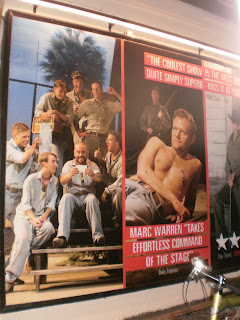
Two plays I attended in West End theatres recently were ones I'd already seen as films, in both cases some years before. Although films and plays have ingredients in common -storyline, acting and settings, to name the three most important elements, I think they're very different.

What it boils down to, really, is that watching plays needs more effort, and I don't just mean having to book in advance and tunr up on time or they might not let you in.
A film runs the same every time regardless of the audience, but actors in a play rely on a response to bring out their best performances. It's the difference between riding a bike and riding a horse (not that I've ever ridden a horse)I was once an amateur actor, so I know something about it. Nowadays, when I'm in the audience,the nearer to the stage I am the more I feel obliged to respond to the actors.
In The Killing of Sister George at the Arts Theatre, for instance, I felt bound to laugh loudly at Meera Syals' lines. It was partly because I thought the actress playing Alice, or 'Childie' put in a weak performance. It wasn't down to me to compensate, but I'm sure I'm not the only member of the audience who felt the same.

I've seen the film of The Killing of Sister George twice, in the cinema and on TV, and thought it was much better than the play. It was funnier - Beryl Reid's tweedy drunk so much more credible as the radio soap's nurse on a scooter, and Suzannah York overtly playing up her sexual charms in her baby doll pyjamas, pretending (in close up) to relish eating George's cigar.

I can hardly remember the film Cool Hand Luke, probably because it's so long since I saw it. I just recall Paul Newman lying on his back on a pool table, his stomach swollen from eating fifty hard-boiled eggs for a bet.

I thought the play Cool Hand Luke at the Aldwych theatre was much better, because the staging was clever and the acting powerful. Marc Warren comes ready supplied with his eccentric loner persona ready-formed from his TV roles, in series such as Hustle.

I was impressed, too, by Lee Boardman, playing his side-kick and promoter,'Dragline'. He was the teeth-baring monster who terrorised Steve, landlord of Coronation Street's Rovers Return. Dragline, Luke's chief supporter in the prisoner bunk-house when he realises that there's money to be made, comes to admire the self-assured outsider bent on self-destruction. The complex role gave Boardman a chance to shine.
There was a real sense of the heat of the Deep South, created by lighting and acting. I liked the musical accompaniment provided by a quartet of female choristers - two gospel singers and two salvation Army members in uniform.
Someone once said that being in a cinema reminds us of the womb - floating in warm darkness, reluctant to return to the real world. Theatre, I think, wakens you up and gives you some responsibility. When all goes well, you feel you played a part the play's success.